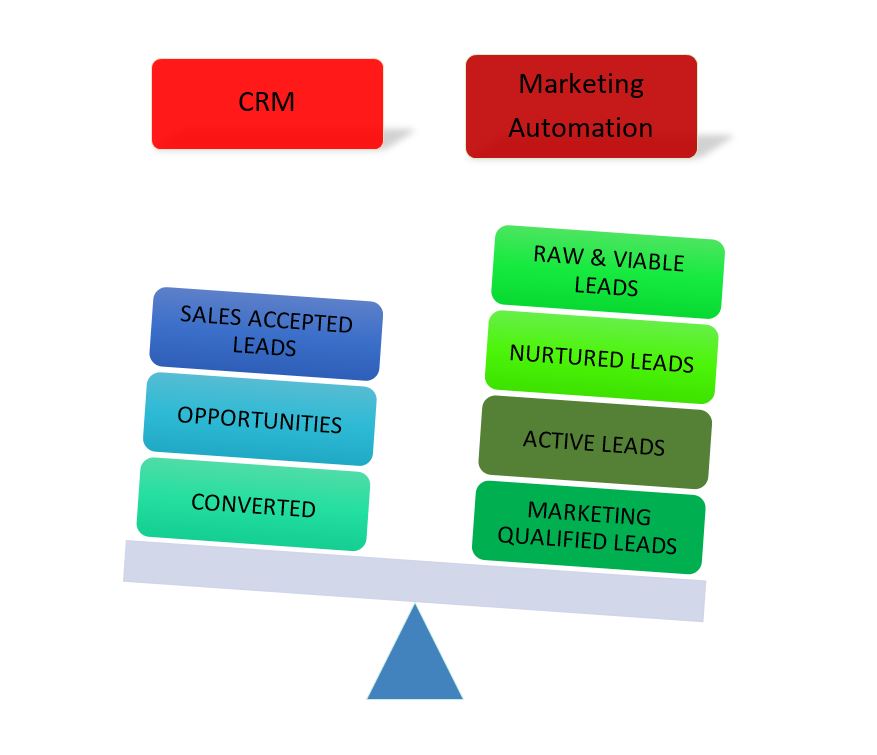CRM and Marketing Automation may seem the same, but actually, they serve two distinctly different purposes.
Confused between CRM and Marketing Automation? You are not alone. Some of the biggest companies mix up the two often. So understanding the difference can give you that edge over others
Begin with the most essential, defining the two by their functions. If you look carefully, the definition is within the name of each of these tools. CRM or Customer Relationship Management manages an organisation’s relation or communication with existing or prospective customers. CRM is highly ‘sales-focused’. On the other hand, marketing automation is the process of automating, streamlining, and measuring efforts of a marketing team of an organisation.
Also Read: The Evolution of the Independent Data-driven Marketer
Delving further, we can say that a CRM software helps in collecting and managing customer data like name, phone number, address, email and quality and quantity of interactions of any business. While Marketing Automation allows marketers to follow customer activities like if they visited the company’s website, which pages did they spend more time on, did they click on contact details or leave their details on a contact form. Marketing Automation also allows you to track email marketing campaigns or other mass communication tools used to reach out to customers.
This image depicts the utility of each software. Depending on the nature of your business and the marketing goal, pick the software that helps you achieve either a sales conversion-led target or a marketing engagement-led target.

What are the benefits of each?
Marketing Automation Software:
One of the most significant advantages of Marketing Automation is that it can curate a list of customers that are prepped for your sales team. In other words, a marketing automation software will only narrow down those leads for your sales team who are most ready to be converted.
Also Read: How Content Can Power Your Marketing Automation
Advantages of Marketing Automation include
- Email Marketing:
A good marketing automation software will have the ability to segment prospects into appropriate mailing lists based on their past interactions with your company or their interests and preferences. - Lead Nurturing:
When is your customer likely to be most open to interacting with your brand? A marketing automation software can calculate this based on past interactions and consumer behaviour and send out automated product and service emails to them at that specific time. - Top of Mind Recall:
Through marketing automation, one can also achieve top of mind recall. How? By scheduling regular communication with your customers, so that they will keep seeing emails from your brand in their inbox when they are most likely to be surfing for a product or service that the company provides. - Measurement & Analytics:
Once your marketing campaign has ended, a marketing automation software will create a detailed report which will help you measure and analyse the success of your campaign. In turn, you can dole out some great facts and figures in your presentation to the management and assure them of the ROI, campaign after campaign.
CRM Software:
According to a survey, almost 56 per cent of all small businesses use CRM software to build and maintain customer interaction. CRM stores all customer-related data and can help an organisation identify the most loyal, most lucrative, and most inclined customers based on historical data.
Also Read: Is It Time We Stopped Talking About CRM?
What are the benefits of using CRM software? They are as follows:
- Track Customer Journey: Sales personnel can see where a customer is in the sales process and help close the deal.
- Promote Intelligently: Your organisation can offer targeted promotional material that’s more likely to lead to a sale and build good faith between you and your customer.
- Know Your Customer: CRM software helps your sales team know your customer when speaking to them. They can have a full picture of who they are and their history with your company, which helps make the conversation as personal and successful as possible.
- Social Media Linked: Many CRMs are linked with social media platforms and help you keep track of which platforms are driving the most traffic, and what people are saying about your company.
- Alerts & Action: CRM can send internal alerts when a call is scheduled, or when a client’s account is set to renew, or even when a customer’s birthday is coming up so that your sales and service reps know to reach out.
How Do I Know What is Best For My Company?
If you’re still confused about whether your business needs a CRM, marketing automation software, or both, then the best thing to do is look at your sales processes (based on the image above). Detect some of your biggest challenges and then make the decision. Here are a few points to help you decide which problem requires what solution:
You Need Marketing Automation When:
- Huge Customer Lists: starts becoming increasingly challenging to manage your ever-growing customer list manually. Are you able to handle all those emails and customer interactions? If not, then you need marketing automation software to make sure each contact goes through the right stages of your marketing funnel to nurture them into a good lead for your sales team.
- Very Small Customer List: If you need to feed more leads to your sales team using marketing automation to standardise your outreach experience is a must.
- Great Product but Poor Reach: So you have a great product or service and no way to get it in front of your customers. Marketing automation software can get your brand in front of the right audiences, faster.
Also Read: 5 Steps to Build a Great Inside Sales Strategy Using CRM
You Need CRM When:
- Bad Customer Service: If you’re repeatedly receiving bad customer service reports, then it might be the right time to invest in a CRM software. Bad customer service is a slow business killer.
- Losing Customers: Customers can get lost in their journey. When they are routed through many different processes and departments, they might lose interest and leave. CRM can track them down and optimise customer journeys.
- From Spreadsheet to CRM: When your traditional lead data tracking system or spreadsheet is unable to handle the volumes, and you have too many leads, then it’s time to use a CRM to manage and track your customer’s data.
Whether you opt for CRM, Marketing Automation or both, knowing their difference can help make each tool more valuable for your sales and marketing teams.









